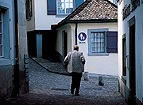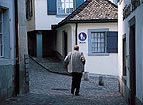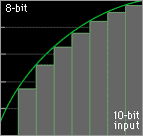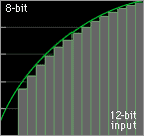JVC Consumer Video's new line of multi-format DVD recorders, including units that combine DVD recording with hard disk drive (HDD), VHS and Mini DV, will begin appearing on the market next month, the company announced.
The DR-M100S DVD recorder will play DVD-RAM, DVD-RW/-R formats, as well as CD, CD-R/RW, VCD, SVCD, JPEG and MP3 files.
Other features include 10 bit/54MHz video digital-to-analog (DAC) converter, 192kHz/24 bit audio DAC, iLink; front DV input; front and rear S-Video and composite inputs; component, S-Video and composite outputs; front audio input; and optical, digital coaxial and analog audio outputs. The DR-M100S will be available in March at $349.95.
Then, the DR-MH300S, combining the DR-M100 DVD recorder with a 160GB hard disk drive into a single deck that provides several simultaneous recording and playback options – recording on the hard disk while playing back from the hard disk or DVD, or recording on DVD while playing back from the hard disk – will be available in July for $699.95.
JVC will also offer a new three-way combination unit, the DR-DX7S DVD/HDD/MiniDV model, combining a Mini DV deck with DVD and hard disk drive recording.
The DR-DX7S, which combines 250GB hard disk drive and DVD recorder with a Mini DV deck – a versatile deck for editing videos on the hard disk drive and then dubbing onto DVD.
Well, the JVC will add a DV player to its best DVD recorders (I doubt that the most DV camera owners will want to pay for additional DV player – redundant option for consumers) and unfortunately the new models for this year will use the obsolete 10 bit/54MHz video digital-to-analog (DAC) converter while SONY and Panasonic have the new 12bit/108Mhz converters that definately offers better PQ.
I think that the JVC is slipping behind the competition…or maybe the strategy is to concentrate on the middle and lower portion of the market… but then it will have to compete with LightOn, Ilo and Daytek, manufacturers that can always undercut JVC prices for a good margin…
+ Reply to Thread
Results 1 to 30 of 63
-
-
I'm not yet convinced that 12bit is anything more than marketing jibber-jabber. "Better PQ" ... the jury's still out on that one.
As long as they continue to work with LSI and their own in-house digital filtering systems, JVC is a strong player in the DVD recorder market.Want my help? Ask here! (not via PM!)
FAQs: Best Blank Discs • Best TBCs • Best VCRs for capture • Restore VHS -
I saw the quality of 12 bit processing on Sony DVD recorders. So far, it is definitely better than any 10 bit chip with fancy name and exuberant manufacturers claims printed on specification papers.
Anyway, lets wait a few more weeks… -
So, how far was it better? 1km, 10km?Originally Posted by zorankarapancev
-
I have a 12 bit JVC player that has an excellent picture. Better than the 10 bit Panasonic I have.Originally Posted by lordsmurf
-
In simple words:So, how far was it better? 1km, 10km?
The process of converting analog signal into digital bits involves two critical steps: sampling and quantization. The better the sampling and quantization, the better the digital image will represent the analog image.
For capturing black text on a white background, it is sufficient to represent the samples with a single bit: if the bit is set to 0 we have white, if it is set to 1 we have black. If we have to capture a more complex image we will need many values or quantization steps to represent each sample.
When you work in 8-bit mode, 256 is the maximum possible number of shades of gray (differences between white and black) available to you. That is two to the power of eight. A 10-bit mode will give you 1024 shades and 12-bit mode will give you 4096 shades of gray.
The color variations that might be the same one color value at 8-bits would be 4-different values at 10-bits and 16 different values at 12-bits. In other words, 12-bits will contain numeric values representing 4 times the number of steps of tones that 10-bits contain.
A billion different colors can be represented with 10 bits, sixty eight billion colors are available with 12-bits.
In simplest words:
The more bits, the better the picture. -
Even with 12 bit it still can't beat pioneer. Pioneer is the Traillblazer of DVD Recorder!!!!!!
-
You are right my friend. Some people can see a difference in PQ between 10 bit AD converters, some will never see a difference between 10 and 12 bit converters, and other will say: I love my recorder even without converter!
-
The high-end Toshiba RD-Z1 which will be introduced in Japan in March has a 14 bit/216MHz video DAC and a 12 bit/110MHz video ADC. These seem to be the best specs so far for a DVD recorder. Another thing to remember is that high-end recorder may require high-end TV/monitor to capture the quality improvement. Unfortunately we may not see this model being sold outside Japan.Originally Posted by zorankarapancev
http://www.avsforum.com/avs-vb/showthread.php?s=c53f27a1d63ff03e3d0d188650f67c7f&threadid=508346 -
The Toshiba’s 600GB RD-Z1 is a HDDVD/PVR (Personal Video Recorder) combo that comes with HDMI digital connection, dual satellite tuners, integrated Ethernet, and an 8x DVD-R/5x DVD-RAM burner, it is backward compatible with DVD and CD and the company is promoting this monster as a competitor against Blu-ray to succeed the DVD format.
As I said before, the 10 bit technology is obsolete... -
I would like to know how many bits of colors are used in the DVD MPEG2 files? I think it is 24-bits. i.e. 8-bit per component of color. If I am right, an extra 2-bit in DAC will definitely improve the output. But how much better will it be with another extra 2-bit?Originally Posted by zorankarapancev
-
Along with the sampling and quantization improvements that a 12 bit processor should bring, remember there are still many other variables to consider. There are plenty of additional digital and analog circuits and processes in these units that affect the overall picture quality.
-
I have a Sony DVD player that uses the 12 bit system and all the others use the 10 bit system and I can see a difference. The Sony's 12 bit system has a cleaner picture to me; as well as a sharper picture too. Like 10 bit is softer or not as sharp, definitions of people and images are not as sharp and defined with 10 bit as oppose to the 12 bit, etc. Personally, I can see a difference and I wonder why my Sony with it's 12 bit playback is so much better looking than any of my 10 bit playback or recording machines which use the 10 bit system; and I'm always wondering and wishing that someone could just use the 12 bit playback abilty of my Sony into their recorders. That's one of the reasons why I'm considering a Sony HD machine as well as the 15 mps video input quality to the hard drive. Personally, so far I can see a difference in playback quality between 12 bit playback and 10 bit and I really like the 12 bit better.
-
Imagination is also a big problem.Originally Posted by gshelley61
Videophiles and audiophiles sometimes take this stuff outside all reasonable boundaries of logic. It's almost eccentricity to some degree. People scream all the time that MP3 is not as good as ___ (fill in blank). And that the "sharpness" or ________ (just pick something ridiculous) of this or that DVD recorder is 1% less.
The fact is 99%+ of all music is still heard on the radio.
And that 99%+ of all video is traditional signals on tv (cable, satellite, antenna).
If you can get your audio or video to sound/look AT MINIMUM as good as those things, you've succeeded.
When it DOES NOT ACHIEVE THIS SIMPLE TASK, that's where I come in bitching and swinging a big stick. RealVideo, RealAudio, WMV, DIVX, Panasonic DVD recorders in 4-hour mode, etc ..... NONE OF THOSE achieves this should-be-simple minimum quality expectation. Maybe in theory, but surely not in practice.
So until products can ALL achieve a minimum specs like this, arguing over 2 bits is as stupid as .... well.... I don't think it really compares to anything. This is the ULTIMATE of stupids.Want my help? Ask here! (not via PM!)
FAQs: Best Blank Discs • Best TBCs • Best VCRs for capture • Restore VHS -
I'm with you. When 12 bit is tested to be better in double blind tests (is that allowed in video testing?Originally Posted by lordsmurf
 I'll take a look. It's like the "super audio CD's" that you can't hear a difference on in 99.9% of systems.
I'll take a look. It's like the "super audio CD's" that you can't hear a difference on in 99.9% of systems.
edit: speeling
-
By all means, 12 bit is always better then 10 bit, but if you don’t know how to use them then you will lose them.gshelley61 wrote:
Along with the sampling and quantization improvements that a 12 bit processor should bring, remember there are still many other variables to consider. There are plenty of additional digital and analog circuits and processes in these units that affect the overall picture quality.
Imagination is also a big problem.
Videophiles and audiophiles sometimes take this stuff outside all reasonable boundaries of logic. It's almost eccentricity to some degree. People scream all the time that MP3 is not as good as ___ (fill in blank). And that the "sharpness" or ________ (just pick something ridiculous) of this or that DVD recorder is 1% less.
The fact is 99%+ of all music is still heard on the radio.
And that 99%+ of all video is traditional signals on tv (cable, satellite, antenna).
If you can get your audio or video to sound/look AT MINIMUM as good as those things, you've succeeded.
When it DOES NOT ACHIEVE THIS SIMPLE TASK, that's where I come in bitching and swinging a big stick. RealVideo, RealAudio, WMV, DIVX, Panasonic DVD recorders in 4-hour mode, etc ..... NONE OF THOSE achieves this should-be-simple minimum quality expectation. Maybe in theory, but surely not in practice.
So until products can ALL achieve a minimum specs like this, arguing over 2 bits is as stupid as .... well.... I don't think it really compares to anything. This is the ULTIMATE of stupids.
And… It is so obvious, that it is really stupid discussing more about it. -
Discussing it ISN'T stupid. Yes, 12 bit is always "better", but does that MEAN anything. 96k sampling rate in audio is "better" than 44.1, but does it make a bit of difference? Not USUALLY.
-


Here you have it: the first image comes from 10 bit processor and the second is from 12 bit processor.
Enjoy it!
arguing over 2 bits is as stupid as .... well.... I don't think it really compares to anything. This is the ULTIMATE of stupids. -
Can anyone tell me please, does the Sony recorder RECORD, as well as play in 12 bit?
Thanks in advance! -
Other than the black levels (or maybe the gamma curves) are different in those two frames, what are we supposed to be seeing? They are really small...Originally Posted by zorankarapancev
-
gshelley61,
Sorry for the small frames. This is only preliminary example and soon, when I will finish my tests, more will come.
Even on these small pictures the difference in resolving power between 10 and 12 bit converters is evident. Where the 10 bit processor sees only a few shades of black, the 12 bit processor sees a whole new world of nuances and detail. As you have noticed, it looks like the proc amp and video processor were used to enhance the picture. -
Yes, Sony RECORD and PLAY in 12 bit.Can anyone tell me please, does the Sony recorder RECORD, as well as play in 12 bit?
Thanks in advance! -
One image is too dark. The end.
Panasonic is too dark.
Sony probably just tweaked the encoder.
Bits had nothing to do with it.Want my help? Ask here! (not via PM!)
FAQs: Best Blank Discs • Best TBCs • Best VCRs for capture • Restore VHS -
Thanks for that.Originally Posted by zorankarapancev
I had a GX3 briefly about a year ago. At the time I did think it made the best 2hr recordings I'd seen, but opinion was that Panasonic was best.
Now I've got a GX300, which is basically the same machine, and I still think 2hr recordings are the best, even though Panasonic and JVC are close competitors. -
You are right. My tests shows the same result:
1. Sony
2. Panasonic
3. Pioneer
3. JVC(without the help of the proc amp and video processor) -
lordsmurf,
I think I know why you always claim that the JVC recordings are not brighter and the ones from Panasonic are too dark. That is because the brightness of your computer screen is set too dark! Brighten up my friend.
One image is too dark. The end.
Panasonic is too dark.
Sony probably just tweaked the encoder. -
Both the Panasonics I've used were closer to the source than the JVC on my recordings.
-
While I agree completely that in theory having 12 bit will improve the picture over 10 bit, those two photos don't prove anything. The second photo has more shadow detail, I don't see what point that makes.
-
It means there's much more information being processed, much more subtlety of tones and colors to the image with a greater dynamic range.The second photo has more shadow detail, I don't see what point that makes.
And you, as a viewer, have noticed that difference even though it was demonstrated with these miniature pictures !
There will always be somebody who will argue that 10 bit resolution offers enough vibrant and rich colors that probably riches or exceeds the limits of the human perception, but the fact is that this level of resolution often looks plasticy when the eyes seek out more tonal variation. Did you notice how the owners of the Sony DVD recorders always state that the picture from their machines looks more NATURAL compared to the others?
The video DAC’s convert the analog signal into digital data before it’s recorded. If you think of the digital data as a set of stairs then the 10 or 12 bit refers to the sampling size that is used to convert the data.
If you draw a line across the edges of the stairs, and consider that line to be the analog data, you would get a smoother and more accurate line with the shorter/more exact length steps. The smoother line should result in fewer color and shadow errors on the picture that will be recorded on the disc. The extra bits improve the ability of the recorder hardware to reproduce exactly what the original analog signal looks like. This increase in precision allows the picture to look better.


-
There's no more detail in the highlights, so it's simply black level differences between the two, nothing 10 bit or even 8 bit couldn't make up for.
Similar Threads
-
Stand alone recorders; more of a problem than PC recorders?
By videobruce in forum DVD & Blu-ray RecordersReplies: 24Last Post: 13th Nov 2009, 11:27 -
JVC SR-MV55US - Users with Experience with JVC Professional S-VHS/DVD Decks
By Anonymous4 in forum DVD & Blu-ray RecordersReplies: 6Last Post: 21st Aug 2008, 15:23 -
Any new JVC DVD Recorders out there?
By MeekloBraca in forum DVD & Blu-ray RecordersReplies: 2Last Post: 12th Feb 2008, 13:24 -
How do JVC combo VHS/DVD recorders compare to M10 or M100?
By DGinnetty in forum DVD & Blu-ray RecordersReplies: 7Last Post: 27th Sep 2007, 12:14 -
new U.S. JVC's DVD recorders
By StuR in forum DVD & Blu-ray RecordersReplies: 7Last Post: 1st Jun 2007, 10:58




 Quote
Quote